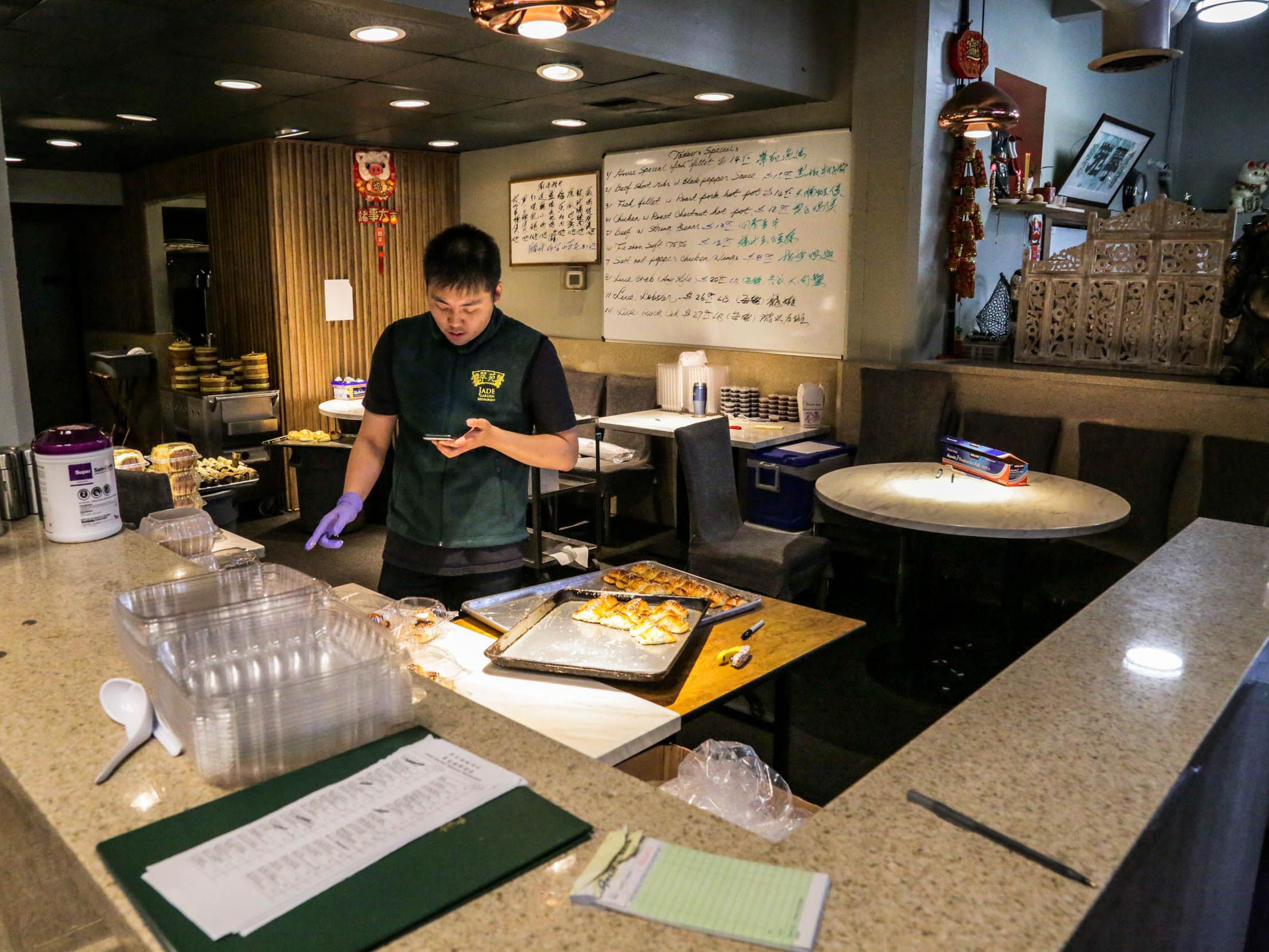- The coronavirus pandemic has dealt an unfathomable blow to independent restaurants, forcing many to close.
- Jade Garden, a family-owned restaurant, is the only one still open on its block in Seattle’s Chinatown.
- But it’s struggled to stay open in the face of vandalism, price gouging, and a lack of staff.
- I went to Jade Garden to talk to the owner, Eric Chan, and to see how the restaurant has adapted to pandemic conditions and continued to scrape up a profit.
- Visit Business Insider’s homepage for more stories.
At 8:30 every morning, Eric Chan arrives at Jade Garden, his family’s restaurant, and starts packing food for delivery orders.
He doesn’t go home until after 9:00 at night.
It’s been this way since the stay-at-home order began on March 23, when Chan was forced to lay off all his employees. Since then, vandalism, delivery platform problems, and issues with suppliers have all dealt additional blows to the already-struggling restaurant.
Now, the restaurant is run entirely by Chan’s family members – his wife, parents, uncles, and aunts – who all work long hours to keep the lights on.
Jade Garden used to be one of Seattle's most lauded dim sum spots. But now its most distinguishing feature is simply that it's still open.
I went to Jade Garden on Tuesday to speak with Chan and to see how Jade Garden was operating during the pandemic. Here's what I found out.
I arrived at Jade Garden right before opening, around 9:00 am.

A neon sign flashing "Open" peeked out over a wall of painted-over particleboard.

A little after 9:00 am, Chan arrived with a load of empty crates for packing delivery orders.

Chan took over Jade Garden five years ago from his parents, who opened the restaurant in 2003.

It's always been a family-owned restaurant, but now Chan's family are the only workers left.

"The employees are gone," said Chan. "We don't have enough money to pay them. And the employees we wanted to keep with what little money we have don't want to work anymore 'cause they're scared to get sick."

Before the pandemic, Jade Garden was one of the most popular dim-sum spots in Seattle.

But, Chan said, business started slowing down in February when news of the coronavirus in China began to spread.

"Because of the stigma, people avoided Chinatown at the end of February," said Chan. "Then when Life Care Center in Kirkland had it, that's when everything went to hell. When someone died, all of our customers just stopped coming."

Life Care Center is a retirement home in Kirkland, Washington, where the majority of the state's early coronavirus deaths occurred.
Chan led me into the banquet hall, where an attempted break-in had occurred on March 26. Someone struck the back window five times with a hard object.

Source: King5 News
Although the window didn't shatter, the break-in attempt caused $1500 worth of damage. Instead of fixing the window and risking more break-ins, the family decided to board up the restaurant's windows instead.

Chan posted about the incident to a Facebook group called "Save the International District" and received an overwhelming response.

Empty-looking businesses and restaurants have become the target of costly break-ins and graffiti tags. International District, otherwise known as Seattle's Chinatown, has been one of the hardest-hit areas.

When Jade Garden regular Keoke Silvano drove by the restaurant and saw it boarded up, he posted a call for artists on Facebook, he told me over the phone.

Keoke Silvano is an educator and photographer. Find his work on Instagram.
Within 30 minutes of Silvano's post, five artists had already volunteered to help Chan out. They met at Jade Garden within the hour and brought their own art supplies.

The artists painted murals on all the window boards, depicting the food still being cooked up by Chan's family insider. Afterward, Silvano and the other artists decided to offer the same free service to other small businesses in the area.

The murals' purpose is twofold: to deter vandals, and let customers know that the restaurant is still open and serving food.

But at this point, vandalism is the least of Chan's worries. The banquet hall where the attempted break-in happened is packed with boxes full of takeaway supplies.

The restaurant's supplier of takeaway containers is closing because they're not considered an essential business, so Chan bought out their entire stock.

Chan said that he's facing issues with all his suppliers. Some have shut down for good, while others "jacked everything up. Prices of pork, shrimp, veggies, everything."

Chan doesn't blame his suppliers for price gouging. Everybody in the industry is short-staffed and struggling to keep their operations going.

With the employees gone, Chan and his wife, parents, uncles, and aunts have been working 13-hour days for the last 17 days. And Chan sees no end to the grind.

Chan and his brother do all the restaurants' deliveries, which are coordinated through Doordash. Chan's friend Josh volunteers to help out sometimes, but Chan isn't able to pay him.

Chan said that Doordash has negotiated a reduced fee for the restaurant, but the platform still takes a large cut. And since Doordash's support hours have been reduced, it's almost impossible to get technical problems solved.

Grocery orders are packed by 10:00, and then Chan, his brother, and sometimes Josh drive the goods to Factoria, Bellevue, and downtown Seattle.

"I don't know how the hell I'm doing it," said Chan. And everyone in his family is pulling the same long shifts, every single day.

Chan recalled when the restaurant would regularly host parties and big events in its banquet hall.

Dim sum is a dine-in meal by nature. Carts loaded with steamed buns, fried dumplings, and other goodies roll by diners sipping tea. Usually, diners come in large groups.

Even though Chan is exhausted, he's grateful for the customers who are still ordering food from Jade Garden. "All that matters is them coming in and supporting us," he said.

Operating during the pandemic, even just for takeout, is risky and earns little profit. "International District is dying right now," said Chan. "A lot of restaurants are closing."

Jade Garden is the only restaurant on its block that's still open. If no one in Chan's family gets sick, Chan says they'll be able to stay that way through the pandemic, but at no small cost.

"We can get through this," said Chan. "But my life will be shortened afterwards. My brain cells are probably going to be diminished a bit."


